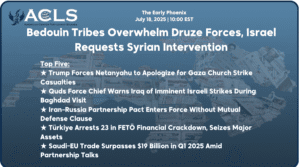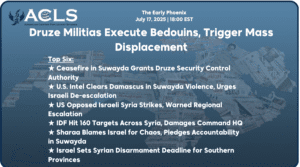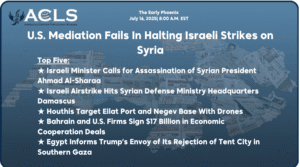The Region
End of the Day Event Analysis
November 21, 2023
The United States
- US Response to Iran-Backed Threats and ISIS in Iraq. The United States is intensifying its military and diplomatic efforts in Iraq, responding to escalating threats from Iran-backed militias and ISIS. This heightened response includes imposing sanctions on individuals affiliated with Kata’ib Hezbollah, an Iran-backed militia, following their attacks on U.S. troops. Despite the Biden administration’s release of funds to Iran, which has drawn criticism for perceived leniency, these sanctions and limited airstrikes signal a tougher stance. Hezbollah’s ridicule of the sanctions indicates ongoing defiance, exacerbating tensions. Concurrently, the U.S. Central Command has significantly ramped up operations against ISIS in Syria and Iraq, conducting 79 operations resulting in numerous casualties and arrests, indicating a dual focus on combating ISIS and countering Iran’s regional influence. This strategy includes drone strikes on militia targets and retaliatory actions like the use of an AC-130 warplane following an attack on the Ain al-Asad airbase. The Pentagon reports over 61 attacks on U.S. bases attributed to Iran-backed groups, underlining the complex security challenges in the region. The U.S. continues to maintain a considerable military presence in Iraq and Syria, emphasizing its commitment to regional stability and the fight against terrorism (Rania Kisar).
Israel & Palestinian Territories
- Strategic Strikes and Technological Advancements in Gaza. The Israeli military has escalated its operations against Hamas, targeting three high-ranking leaders of the militant group’s military wing. This operation, conducted with fighter jets and supported by Shin Bet intelligence, significantly impacted Hamas’ command structure. Concurrently, the Israeli Army employed the Iron Sting guided mortar for the first time, striking 70 Hamas targets with precision to minimize civilian casualties. Additionally, the IDF’s 162nd Division intensified efforts in northern Gaza, particularly in Jabaliya, a major Hamas stronghold. This operation, a response to a recent border breach by Hamas terrorists, combined artillery and air strikes aiming to dismantle Hamas’ influence and rescue hostages. Despite facing 68 IDF soldier casualties, this campaign marks a significant advancement in Israel’s military strategy and technological capabilities in the region.
- A Major Step in Resolving Israel-Hamas Hostage Crisis with Key Mediation by Egypt and Qatar. The hostage crisis between Israel and Hamas is seeing significant progress with the imminent release of 53 captives and potential freedom for 20 more, under a deal mediated by Qatar and awaiting Israel’s approval. This agreement, which includes a four-day ceasefire extendable upon further releases, also mandates Israel’s release of 140-150 prisoners, increased humanitarian aid, and reduced aerial activities over Gaza. In this context, Islam’s condemnation of the use of children as hostages is a critical aspect, underscoring the need for humane treatment and the release of young captives. The involvement of Egypt and Qatar as key mediators has been pivotal, with Qatar’s Foreign Minister expressing confidence in a soon-to-be-finalized agreement. The Hostages and Missing Families Forum, advocating for intervention against Hamas’s treatment of child hostages, and MK Mansour Abbas’s meetings with affected families further highlight the humanitarian concerns. This scenario indicates a significant step towards resolving the hostage crisis, balancing the demands for safety, rights, and diplomatic negotiations.
- UN Chief Guterres Denied Entry into Gaza, Sparks Global Criticism. UN Secretary-General Antonio Guterres’ recent denial of entry into Gaza has drawn significant international attention and criticism. This denial of entry coincides with Guterres’ rejection of a UN-sponsored protection system in Gaza post-conflict. Instead, Guterres advocates for a transitional phase involving the United States and Arab nations, focusing on strengthening the Palestinian authority and moving towards a two-state solution based on international principles.
==========================
Iran
- Iran Threatens to Escalate Gaza Conflict with Proxy Involvement Amidst Rising Tensions. Iran has issued a stark warning, hinting at an escalation in the Gaza conflict through potential involvement of its proxies in Iraq and Yemen. This comes as Mohsen Rezaee, former chief of the Iranian Revolutionary Guards, anticipates new fronts opening alongside Hamas. The situation is further strained by the recent hijacking of an Israeli-leased cargo ship, an act Iran blames on the U.S., suggesting a shift in the regional power dynamics. These developments mark a significant increase in regional tensions and signal Iran’s readiness to expand its influence in the ongoing conflict.
- Iran’s Economic Struggles: Contrasting Reports of Booming Trade with Electricity Export Crisis. Reports from Iranian media claim significant trade growth with the UAE and Armenia, projecting a booming economic scenario. Iran’s Minister of Roads and Urban Development, Mehrdad Bazrpash, declared a $34 billion trade volume with the UAE in 2022 and anticipated enhanced bilateral cooperation. Concurrently, Armenia reportedly seeks to strengthen its energy ties with Iran, aiming to reduce reliance on Russia, with trade expectations reaching $1 billion. These optimistic reports, however, contrast starkly with Iran’s internal challenges as highlighted by international sources. Iran’s electricity exports have plummeted to zero due to domestic power shortages, heightened by increased consumption and inefficiencies in its government-controlled economy. Years of foreign sanctions and the low efficiency of power plants contribute to this decline, with Iran potentially becoming a net electricity importer. This juxtaposition of reports suggests a nuanced picture of Iran’s economic status, with domestic challenges undermining the optimistic portrayal by Iranian media.
==========================
Syria
- Urgent Call: Syria’s Bashar Assad Must Go. This report, from the Jerusalem Center for Public Affairs, emphasizes the need for the removal of Bashar Assad from power in Syria. It highlights Assad’s close alliance with Iran and support for Hezbollah, suggesting that focusing on Syria rather than engaging in an all-out war with Hezbollah could have strategic advantages for Israel and the United States. The report argues that Assad’s fall could disrupt Iran’s influence in the region and have far-reaching implications.
==========================
Lebanon
- Escalation on Israeli-Lebanese Border: Intensified Military Actions and Diplomatic Efforts. Israel has dramatically intensified its military presence along the Lebanese border, deploying 100,000 troops in response to ongoing Hezbollah operations. This escalation includes air and ground strikes, leading to civilian casualties and infrastructure damage. Amidst these rising tensions, Amos Hochstein, a senior adviser to President Biden, is in Israel to discuss diplomatic solutions and urge Hezbollah’s withdrawal from the border area. Concurrently, the Lebanese Army Chief has accused Israel of using internationally prohibited ammunition, causing significant damage in southern Lebanon. In a notable development, Khalil Harraz, the deputy commander of Hamas’ Al-Qassam Brigades in Lebanon, along with other senior figures, was killed in an Israeli strike. This event is part of the increasing hostilities, which include Hezbollah targeting an Israeli military base and Israel conducting airstrikes that resulted in journalist casualties from Al Mayadeen newspaper known to be run by the Iranians. The UN has expressed concern over these developments, highlighting the complex and volatile situation that encompasses both aggressive military actions and ongoing negotiations for a ceasefire and hostage release.
==========================
Turkiye
- Turkish Leadership’s Critique of Israel Spurs Activist-Led Flotilla, Recalling 2010 Incident. The Turkish leadership’s outspoken criticism of Israel and the West’s response to the Gaza conflict has seemingly influenced a significant activist response. About 1,000 boats, organized by Turkish activist Volkan Okçu, are assembling in Turkey, aiming to disrupt Israeli marine activities. This action, reminiscent of the 2010 Gaza Freedom Flotilla incident, involves international activists and focuses on blocking Israeli trade while delivering aid to Gaza through nonviolent means. This development is a direct reflection of the sentiments expressed by Turkish President Recep Tayyip Erdogan and First Lady Emine Erdogan. President Erdogan has condemned European leaders for their Holocaust shame and their stance on Israel, while the First Lady has implied U.S. complicity in the Gaza conflict due to its military support to Israel. Additionally, Turkish Foreign Minister Hakan Fidan has warned of escalating crises due to Western inaction. These combined factors highlight Turkey’s critical view of Western policies and its active role in supporting Palestinian causes. The flotilla’s formation coincides with escalating regional tensions, including Hezbollah’s attacks on Israel’s northern border and the Houthis’ hijacking in the Red Sea, amid the ongoing Israeli offensive in Gaza and talks of a potential truce.
==========================
Iraq
- Iraq Political Crisis: Al-Halbousi Ousted, External Powers Intervene. Iraq’s political landscape is facing significant upheaval following the Federal Supreme Court’s removal of Muhammad al-Halbousi as Speaker of Parliament, citing allegations of forgery and manipulation in the resignation of former MP Laith Al-Dulaimi. This decision, highlighting procedural breaches and potential fraudulent actions, underscores the deep-seated challenges within Iraq’s political system. Adding to this complexity is the evident involvement of regional powers like Iran, Turkey, and Qatar, which have reportedly communicated with Sunni and Shiite political parties regarding the appointment of a new parliament speaker. Their engagement reflects a broader interest in shaping Iraq’s political direction, especially with the upcoming provincial council elections. Concurrently, Iraqi Prime Minister Muhammad Shia al-Sudani has refused the resignations of three ministers from the Taqaddam Party, who resigned in protest over Al-Halbousi’s dismissal. Al-Sudani’s move to maintain representation and stability in the government further illustrates the intricate balancing act in Iraq’s sectarian and factional political environment. These developments paint a picture of a nation grappling with internal governance issues and external influences, reflecting a challenging phase in its post-2011 trajectory.
==========================
The Gulf Region & Yemen
- Three Years Post-Delisting, Houthis Challenge U.S. with Red Sea Confrontation. The recent seizure of the “Galaxy Leader” ship by the Houthi group in the Red Sea has intensified regional tensions, posing a significant challenge to the current U.S. administration’s approach towards the group. Notably, this administration’s first executive order upon taking office was to delist the Houthis from the terrorist list and halt sanctions, a decision now under scrutiny in light of recent events. A Pentagon official emphasized the seizure as a threat to navigation freedom, implicating Iran’s involvement and asserting that it contravenes international law. In a bold statement, the Houthi group has warned against foreign intervention in Yemeni waters, asserting their control over the western coast and readiness to use missiles and weapons in defense. Moreover, the group has vowed continuous attacks aimed at Israel’s “demise,” declaring their autonomy from Iranian influence and willingness to confront the U.S. The situation has become a litmus test for the U.S. administration, balancing its initial diplomatic approach with the need to respond to the Houthis’ aggressive actions and their implications for regional stability and international maritime security.
- Can Arab Nations Successfully Lead Global Efforts for Gaza Peace and Ceasefire? The Arab-Islamic ministerial committee’s decision to initiate their diplomatic tour for a Gaza ceasefire in China and Russia presents a complex and somewhat paradoxical scenario in the realm of international diplomacy. This choice raises critical questions about the alignment of values and objectives, especially considering the current global context. China, as a starting point for the initiative, is a significant global player with substantial diplomatic influence. However, China’s human rights record, particularly concerning the Uyghur Muslim population, casts a shadow over its role as a mediator in a conflict deeply rooted in religious and ethnic tensions. The treatment of Uyghur Muslims contradicts the principles of religious freedom and human rights, essential elements in any peace process in the Middle East. This contradiction might lead to skepticism about China’s commitment to impartiality and justice in the Gaza conflict. Similarly, Russia‘s involvement, demonstrated by Foreign Minister Sergey Lavrov hosting a meeting with Arab foreign ministers, adds another layer of complexity. Russia’s actions in Ukraine, marked by widespread condemnation for the humanitarian crisis, bring into question its role as a peacemaker. The Arab world’s pursuit of peace in Gaza through Russian mediation might appear incongruous, given Russia’s current military engagements and their humanitarian implications.
==========================
Follow the latest news from the American Center for Levant Studies via Google News
In cased you missed yesterday’s analysis of the Region’s event analysis, go here.



